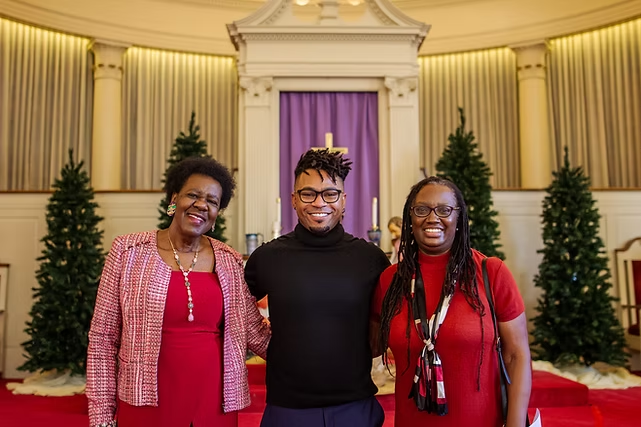Justice League of Greater Lansing Michigan awards Reparations Scholarships to 10 students
- Yanice Y. Carter

- Aug 3, 2025
- 3 min read

LANSING, Mich — Justice League of Greater Lansing Michigan has awarded 10 Reparations Scholarships totaling $25,000 to college-bound students. This is the second annual distribution for scholarships from the Justice League’s Reparations Fund, created to address the racial wealth gap in Greater Lansing.
The non-for-profit organization presented the $2,500 scholarships at an event with the recipients, their families and Justice League supporters at Lansing Church of God in Christ, Saturday, Aug. 2.
“Every year this scholarship disbursement is monumental for our organization — the culmination of years in the making,” said Prince Solace, president and co-founder of the Justice League of Greater Lansing Michigan. "The program is the result of intergenerational and cross-racial and cross-denominational support stemming primarily from Greater Lansing, but also from beyond our community.”
He continued to define the support, “The Reparations Fund has been built by reparations payments from churches and individuals in Greater Lansing who have taken a proactive approach to social justice and from donations by Black advocates. Our African American Advisory Council and executive leadership provide wisdom, integrity and focus to our mission. And it’s through education and community engagement that this project takes root. We are thankful to all of our dedicated volunteers."
Recipients, their hometown and high school, and where they will study this fall are:
Elaina Andrews, East Lansing, East Lansing High School, Louisiana State University
Jourdyn Carter, Lansing, Everett High School, Michigan State University
Karrington Cosey, Okemos, Okemos High School, North Carolina Central University
Talia Dunn, East Lansing, East Lansing High School, Oakland University
Ryleigh Lewis, Holt, Holt High School, University of South Florida
Cameron Minor, Lansing, Eastern High School, Western Michigan University
Gabrielle Pruitt, Mason, East Lansing High School, Grand Valley State University
Markell Richardson, Lansing, J.W. Sexton High School, Michigan State University
Malachi Turner, Lansing, East Lansing High School, Alabama A&M University
Corinne Williams-Hough, Lansing, East Lansing High School, Florida State University
Recipients were selected based on their essays; academic grades were considered. Finalists were interviewed.
Willye Bryan, vice president and founder, said applicants were asked to write essays that examined how they and their families have been affected by America’s racial wealth gap or by generational wealth.
She said, “Centuries of systemic inequalities in the U.S. have strongly negatively affected African Americans’ ability to accumulate wealth and have created a racial wealth gap. The social and financial cost to Black Americans continues to be great. The time to address these disparities is now.”
Here are excerpts from three winning essays:
“Economically, the [racial wealth] gap means that I move through life with far less ease than wealth provides. I see it all around me — on TV, in music, in the everyday experiences of my classmates. Wealth creates a soft landing, a margin of error, a set of options. It provides breathing room, a buffer that allows people to imagine, explore, and sometimes even fail without losing too much ground. As I get older, I realize that is not a luxury I have been given. I have witnessed my mother taking on extra jobs, not out of ambition but out of necessity — to carve out a foothold for me, to hold the line so I can dream.” — Corinne Williams-Hough
“Socially, the racial wealth gap has caused a visible but unspoken division in how people may interact and how people are perceived. I have often felt the need to prove my belonging in an academic or professional space, especially when no one else there looks like me. That has affected my view of America and has made a rather negative impact on my mental health, living in constant stress and feeling left behind or not good enough. These challenges have made me more aware and resilient, and I am determined to break the cycle.” — Talia Dunn
“I learned about the long history of financial discrimination in America … particularly redlining … These policies, enforced by banks and government institutions, prevented many Black families from buying property, a key step in building generational wealth. I was shocked to learn how these practices still affect communities today. Through conversations with my parents, I began to see how systemic inequality continues to shape the lives of families who are still trying to catch up economically.” — Malachi Turner
The 10 essays are posted on the Justice League’s website: www.JusticeLeagueGLM.org.
Eligible applicants were descendants of enslaved African Americans and residents of Ingham, Eaton or Clinton counties.
The Justice League was founded in 2021 to address the racial wealth gap in Greater Lansing.










Comments